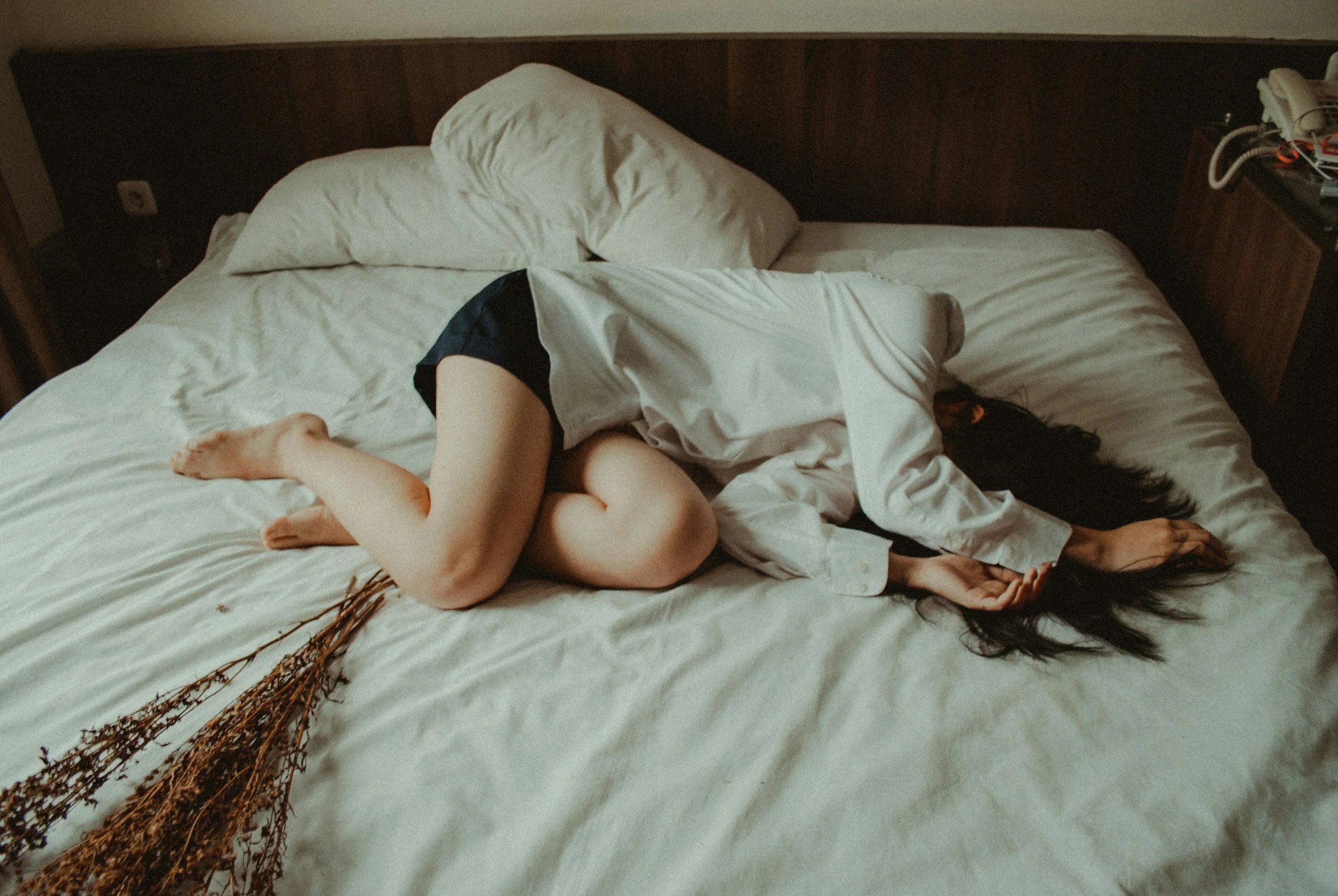The Weight of It All: How Lifestyle Habits Influence Depression and Mental Health
Exploring the Complex Link Between Weight Loss, Daily Routines, and Depressed Mood
Have you ever noticed how your worst mental health days often coincide with your worst physical days? When anxiety peaks, your stomach churns. When depression settles in, your body feels like it weighs a thousand pounds. This isn't coincidence, it's biology. Your brain and your body are having a constant conversation, but most of us never learned to listen in.
The intricate dance between our daily habits and mental health is more profound than most of us realize. As a psychotherapist who specializes in disordered eating and integrative nutritional health, I've witnessed countless clients discover that healing their relationship with food, movement, and daily rhythms can be as transformative as traditional talk therapy, sometimes more so.
The truth is, depression doesn't just live in our thoughts; it lives in our bodies, our routines, our gut bacteria, and even in how we respond to morning light. So grab a cup of something warm and let's explore five everyday habits that profoundly shape our mental landscape, while honoring the fact that each person's psychological and biological blueprint is beautifully unique.
FOOD = MOOD: THE GUT- BRAIN HIGHWAY
Here's something that might surprise you: about 90% of your serotonin (that crucial "feel-good" neurotransmitter) is actually made in your gut, not your brain. This means your intestinal bacteria are basically tiny pharmacists, brewing up the chemicals that influence whether you wake up optimistic or spend the day battling intrusive thoughts.
When we're stressed, anxious, or depressed, we often reach for processed comfort foods that temporarily soothe but ultimately fuel inflammation in both the gut and brain. It's a vicious cycle: poor mood leads to poor food choices, which leads to gut dysfunction, which deepens the depressed mood.
In fact, emerging research in the field of nutritional psychiatry confirms that gut health and mental health are intimately connected. Studies have shown that diets high in ultra-processed foods and low in fiber can disrupt the gut microbiome, increasing inflammation and the risk of depression and anxiety [1]. Conversely, people who eat more fruits, vegetables, whole grains, and healthy fats tend to have lower rates of mental illness [2].
But here's where it gets fascinating from a psychological perspective: the foods that make one person feel mentally clear and emotionally stable might leave another person bloated, brain-fogged, and irritable. This isn't just about willpower or "eating clean", it's about understanding your unique genetic makeup, trauma history (which affects digestion), cultural food relationships, and even how your nervous system responds to different textures and flavors.
I've worked with clients who discovered that their Sunday scaries were actually gluten sensitivity, and others whose afternoon anxiety melted away when they started eating protein within an hour of waking. The key is curious self-observation without judgment, and treating your body like a fascinating science experiment rather than an enemy to control.
MOVEMENT: REWIRING THE ANXIOUS BRAIN
Exercise is perhaps the most underutilized antidepressant on the planet. When we move our bodies, we're literally rewiring our brains. Physical activity triggers your brain to produce something called BDNF, which you can think of as brain fertilizer. This helps grow new connections that can literally rewire you out of stuck patterns of worry and despair. Research consistently shows that regular physical activity can reduce symptoms of depression as effectively as medication or therapy for some individuals—especially in cases of mild to moderate depression [3]
But here's what's crucial to understand: the psychological relationship with exercise is just as important as the physical act itself. For many people struggling with depression, the gym can feel like a monument to everything they "should" be doing but aren't. The internal critic gets louder with each skipped workout, creating shame that deepens the depression.
This is why I often encourage clients to start with what I call "movement for mental health" rather than "exercise for weight loss." Maybe it's dancing alone in your bedroom to three songs. Maybe it's walking while listening to a favorite podcast. Maybe it's gentle yoga that feels more like therapy than fitness.
The goal isn't to optimize your body; it's to befriend it. When we approach movement from a place of self-care rather than self-improvement, something magical happens: the shame melts away, and the natural mood-boosting benefits can finally emerge.
SUNLIGHT: RESETTING MORE THAN YOUR SLEEP
Morning sunlight isn't just about vitamin D, it's about resetting your entire emotional operating system. When natural light hits your retinas within the first hour of waking, it triggers a cascade of neurochemical events that influence your mood for the entire day.
In fact, exposure to morning light has been shown to reduce symptoms of depression, particularly in people with Seasonal Affective Disorder (SAD), but also in those with non-seasonal depression [3]. Even indirect light, like sitting near a window, can begin to shift your internal rhythms back into alignment. [4]
But here's what's psychologically interesting: many people with depression have developed an almost phobic relationship with mornings and daylight. The thought of stepping outside can feel overwhelming when you're already struggling just to get out of bed. This is where self-compassion becomes crucial.
I've seen clients start with just opening their bedroom curtains, then gradually working up to sitting by a bright window, then eventually stepping onto their porch with their coffee. The key is honoring where you are rather than forcing yourself into some idealized morning routine that feels impossible.
What's fascinating is how this gentle approach to light exposure often mirrors the healing process itself—small steps, self-compassion, and trusting that your system knows how to respond when given what it needs.
ROUTINE & SLEEP: THE ANXIOUS MIND'S BEST FRIEND
Your brain craves predictability, especially when it's already working overtime to manage difficult emotions. Consistent sleep and wake times aren't just about feeling rested—they're about giving your nervous system a sense of safety and control.
Here's the psychological piece that's often overlooked: for many people with depression or anxiety, bedtime can trigger a flood of rumination. The quiet darkness becomes a breeding ground for worry, regret, and catastrophic thinking. This is why so many of my clients describe themselves as "night people" who feel more creative and alive after midnight.
But what's really happening is that exhaustion has finally quieted their overactive minds enough to feel some relief. The problem is that this relief comes at the cost of the restorative sleep their brains desperately need to regulate emotions the next day.
The science backs this up: a landmark study published in The Lancet Psychiatry found that people with irregular sleep patterns—those who went to bed or woke up at inconsistent times—had significantly higher rates of mood instability, depression, and loneliness, even after adjusting for other factors like physical activity and socioeconomic status [5].
Creating a gentle wind-down routine isn't about perfection, it's about interrupting the cycle of nighttime anxiety. Maybe it's writing three things you're grateful for, maybe it's a warm bath with Epsom salts, maybe it's listening to a boring podcast until your eyelids get heavy. The ritual itself becomes a signal to your nervous system: "It's safe to rest now."
CONNECTION: THE ANTIDOTE TO ISOLATION
Depression is a master at convincing us that we're better off alone. It whispers that we're too much, too broken, too heavy for others to handle. But isolation feeds depression like oxygen feeds fire - the more alone we become, the more distorted our thinking gets.
Connection doesn't have to mean deep heart-to-hearts or vulnerability hangovers. Sometimes it's texting a friend a funny meme. Sometimes it's making eye contact with the barista who makes your coffee. Sometimes it's joining a group where you can focus on something outside yourself—a book club, a hiking group, a pottery class.
What I find beautiful in my work is watching clients rediscover that they're not as alone as their depression told them they were. There's something profoundly healing about realizing that your struggles don't make you defective, they make you human.
The tricky part is that different personality types need different kinds of connection. Introverts might thrive with one deep friendship, while extroverts might need a wider social circle. Some people find community through shared activities, others through vulnerable conversation. There's no one-size-fits-all approach to belonging.
THE BIGGER PICTURE
What I've learned after years of working with people struggling with food, body image, and mental health is this: healing happens in layers. You can't think your way out of a biology that's been disrupted by poor sleep, inflammatory foods, isolation, and disconnection from natural rhythms.
But you also can't supplement or exercise your way out of unprocessed trauma, limiting beliefs, or painful relationship patterns. True healing happens when we address both the psychological and the physiological—when we understand that our minds and bodies are constantly influencing each other.
This doesn't mean you need to overhaul your entire life tomorrow. In fact, that kind of all-or-nothing thinking often keeps people stuck. Instead, it means getting curious about the connections between your daily habits and your emotional world. It means treating yourself like someone worth caring for, not someone who needs to be fixed.
A GENTLE INVITATION
If you recognize yourself in these page, if you've been struggling with the weight of depression, anxiety, or a complicated relationship with food and your body, please know that you don't have to figure this out alone. As a psychotherapist who specializes in the intricate dance between mental health and lifestyle factors, I've seen how powerful it can be when someone finally feels understood in their struggle.
The intersection of psychology and physiology is where real healing happens. It's where we stop battling our bodies and start listening to them. It's where we move beyond quick fixes toward sustainable, gentle changes that honor both your emotional needs and your biological reality.
In my practice, I work with people who are tired of the endless cycle of dieting and restriction, who want to understand why their mood feels so unpredictable, who are ready to explore how their daily choices might be either supporting or sabotaging their mental health. Together, we create space to examine not just what you're eating or how you're moving, but why certain patterns feel so hard to change and what your symptoms might be trying to tell you.
Because here's what I know to be true: you are not broken. You are not lazy. You are not too much or not enough. You are a complex, beautiful human being whose mind and body are doing their best to navigate a world that often feels overwhelming. Sometimes that system just needs some extra support, understanding, and recalibration.
If any of this resonates with you, I encourage you to reach out. Healing doesn't have to happen in isolation, and you don't have to carry the weight of it all by yourself.
Jacka, F. N., et al. (2010). Association of Western and traditional diets with depression and anxiety in women. American Journal of Psychiatry, 167(3), 305–311.
https://doi.org/10.1176/appi.ajp.2009.09060881Opie, R. S., et al. (2015). Dietary improvement for adults with major depression: A randomized controlled trial (the ‘SMILES’ trial). BMC Medicine, 15, 23.
https://bmcmedicine.biomedcentral.com/articles/10.1186/s12916-017-0791-yExercise as Treatment for Depression
Blumenthal et al. (1999). Effects of exercise training on older patients with major depression. Archives of Internal Medicine, 159(19): 2349–2356.
Found exercise to be as effective as Zoloft (sertraline) in reducing depressive symptoms.Schuch et al. (2016). Physical Activity and Incident Depression: A Meta-analysis of Prospective Cohort Studies.Am J Psychiatry, 175(7): 631–648.
https://doi.org/10.1176/appi.ajp.2018.17111194
Golden et al. (2005) – The efficacy of light therapy in the treatment of mood disorders: a review and meta-analysis. American Journal of Psychiatry, 162(4), 656–662. https://doi.org/10.1176/appi.ajp.162.4.656
Lyall, L. M., et al. (2018). Association of disrupted circadian rhythmicity with mood disorders, subjective wellbeing, and cognitive function: a cross-sectional study of 91,105 participants from the UK Biobank. The Lancet Psychiatry, 5(6), 507–514. https://doi.org/10.1016/S2215-0366(18)30139-1




